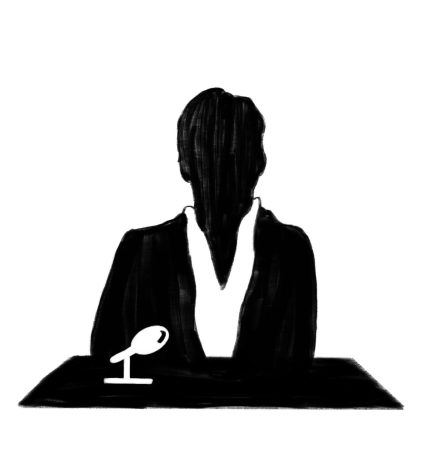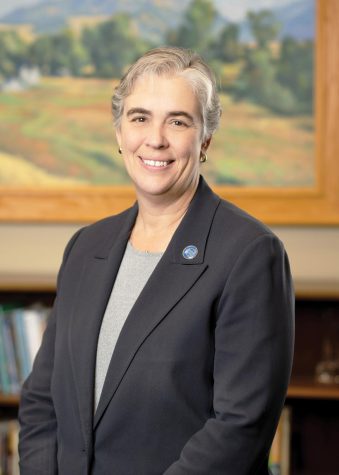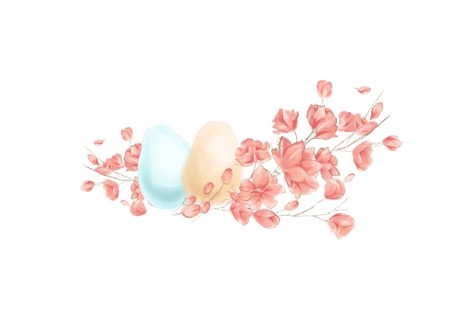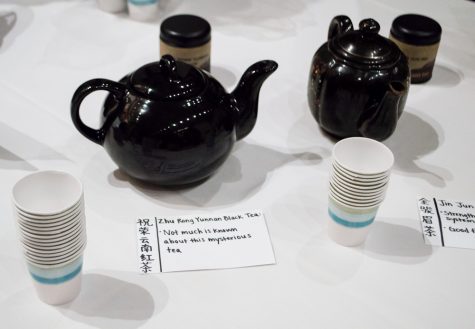President Sarah Bolton prepares for her installation
April 27, 2023

Only a few weeks before commencement of the class of 2023, Whitman is setting out to install its 15th president: President Sarah Bolton. In preparation for the installation weekend, President Bolton sat down with The Wire to discuss what the installation is all about and how her first year at Whitman has gone. The following conversation has been edited for brevity and clarity.
Wire: What is a presidential installation?
Bolton: The installation is really the formal moment of conferring the presidency on a president.
It happens sometimes quite a little bit of time after the person has started. There’s really different traditions. [At] some places, people do it right away in September of their first year. I know other people who haven’t done it even until their second year. There were some presidents during COVID-19 who didn’t do it even until their third year because they couldn’t get people together.
I think of it as a celebration of the community. It’s an opportunity for me to talk about some of the great things that I’ve seen at Whitman, and it’s an opportunity for folks to visit campus who haven’t been here. [It’s an opportunity] to share with those who don’t know Whitman at all a little bit about what this place is.
Wire: What determines when it happens?
Bolton: We could have done it in the fall or in the spring, and I chose to do it in the spring for a couple of reasons. One of them was thinking about the ways that staff and faculty, but particularly staff, had been working so hard during the pandemic and really not wanting people to have to push to put on a really big and complex event right at the beginning of the fall because it would’ve driven a lot of staff to have to be working very, very intensely through the summer.
Of course, I talked to colleagues here and to the Board [of Trustees] about it, as well. They were comfortable with that timing.
Wire: What happens at the installation ceremony?
Bolton: There’s a couple of parts to it. The main parts are that the Board of Trustees officially gives me some of the symbolic pieces of office, which includes a formal medallion with the College seal on it and the charter of the College. Also, more generally, it’s a place where the Board Chair is saying to the community, again, how was the president selected, what were their priorities and formally [welcoming] me into the role. Then there are a couple of additional members of the college community who say a few words. There’s a student, a faculty member and a staff member who will each say a couple of words, essentially welcoming the new president on behalf of different constituents.
Then I’ll be introduced. Typically the new president is introduced by someone who knows them well from someplace else they’ve worked. I’ll be introduced by Sean Decatur who’s the Head of the American Museum of Natural History in New York. He used to be the president of Kenyon; we worked together in Ohio for a long time. Then I give some comments for 15 minutes or so. I’ll talk about Whitman, about some of the things that I’ve learned and some thoughts for the future. There’s some beautiful student music performances.
The installation itself sits in that context of the larger weekend where there’s a lot of space to celebrate the community.

Wire: How have you gone about preparing what you’re going to say?
Bolton: It’s been a lovely opportunity for me to reflect on the year and to think about the ways that I’ve seen students, faculty and staff doing wonderful things on campus.
I’ve reread the histories of the college. I read them before I started a little bit too, but it’s different to read them once you’ve been here: to think about where the College is now in the context of its larger history.
Then I’ve really been drawing from the conversations that have come through the strategic planning process where folks have really been talking about what are their dreams and aspirations for the academic program, for student life, for the ways we advance diversity, equity and inclusion and anti-racism on campus and for the ways that we help students make sure that they have a great experience here and get to jump off and do what’s most important to them. Those conversations have really informed some of the things I’m going to say.
Wire: How would you assess your first year at Whitman?
Bolton: I’m just still really grateful to be here, which is what I said when I was interviewed a year ago. It’s been so exciting to see the ways that the College has been a part of the lives, both of current students and of alumni.
I felt really fortunate this year in a couple of ways. It’s great to have arrived at a time when we don’t have to be in isolation from one another. My sense when I arrived was that the community was really struggling with that isolation, even though the College had been open in the prior year. People were still pulled back in a lot of ways, for good reasons around being protective of everybody’s health. I had the good fortune to arrive at a time when people could get back together, and they really wanted to.
Part of what I’ve tried to do is have a lot of events that people can come to, be at a lot of events that are going on and people have just been so glad to be together as a community.
[I was] also fortunate to arrive at a time when we are needing to be thinking about what our plans are for the future because it gives us that opportunity to have bigger conversations.
Wire: What do you hope next year and beyond brings?
Bolton: I think this has been a really good year to set up some big ideas that folks are thinking about, and next year we’re going to be really starting to jump in and talk about what it looks like to make some of those things happen.
This is what I’ve heard, particularly from students, “So you say you wanna have this vibrant, really welcoming community. What’s that going to look like? What changes do we need to make? What support do we need to put in place? How do we enact and implement some of those ideas?”
I think it’s going to be a year, still of a lot of conversation and planning, but more and more specific about what the pieces are that we’re going to be looking at.
That’ll give us a different pace for the year. [There are] a lot of really different interesting things moving are forward as well, so I’m excited about it.







